Devon Trevarrow Flaherty's Blog, page 67
September 29, 2014
Seasonal Affective Writing Disorder
 Let’s face it. Stuff around us matters. That’s the reason so many writers have such elaborate rituals. What we can hear matters. How cold it is matters. That giant oak tree outside the window matters. Whether we’ve have a cup of coffee. What our husband said to us last night. Not that all stars have to be aligned to write. Au contraire: they never will be. But what is going on around and in us (physically and otherwise) affects what we write. (Oh gracious. Here I go trying to figure out the difference between effect and affect.)
Let’s face it. Stuff around us matters. That’s the reason so many writers have such elaborate rituals. What we can hear matters. How cold it is matters. That giant oak tree outside the window matters. Whether we’ve have a cup of coffee. What our husband said to us last night. Not that all stars have to be aligned to write. Au contraire: they never will be. But what is going on around and in us (physically and otherwise) affects what we write. (Oh gracious. Here I go trying to figure out the difference between effect and affect.)
So let’s take a moment on this finally fall morning to reflect on how seasons may be changing how and what we write.
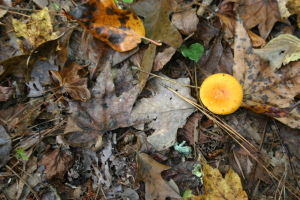 First off, it’s the weather, right? Now, not everyone enjoys the same weather, but generally if you take a Michigander and yank them out of a snow drift in February and stick ‘em on a cruise ship, you have one happy camper. Moods change with the weather, and not just happy/sad. The differences can be more subtle. Perhaps rainy days make you more introspective, or sunny days more peaceful. Whatever a windy day does to you, it’s liable to splash out onto the page as much as it splashes out into your relationships or choices or habits. Are you more likely to accidentally pull over into the Starbuck’s drive through on a chilly, drizzly day? Is your current novel heroine going to find a ray of hope in her dire circumstances when the tulips have taken advantage of a perfumed spring day to suddenly emerge from the edges of your walkway? Yes and yes.
First off, it’s the weather, right? Now, not everyone enjoys the same weather, but generally if you take a Michigander and yank them out of a snow drift in February and stick ‘em on a cruise ship, you have one happy camper. Moods change with the weather, and not just happy/sad. The differences can be more subtle. Perhaps rainy days make you more introspective, or sunny days more peaceful. Whatever a windy day does to you, it’s liable to splash out onto the page as much as it splashes out into your relationships or choices or habits. Are you more likely to accidentally pull over into the Starbuck’s drive through on a chilly, drizzly day? Is your current novel heroine going to find a ray of hope in her dire circumstances when the tulips have taken advantage of a perfumed spring day to suddenly emerge from the edges of your walkway? Yes and yes.
 And then it’s the comfort level. Are you achy in the winter? Sneezy in the spring? Do you get too hot too easy? Or sunburned? Or love the feel of heat on your skin? Yeah, that’s going to matter, too. I get so ridiculously tired in the spring–even on medication–from my allergies that I can barely function. You think that might have some effect on my writing? And on how much writing I do? And how fast? You betcha.
And then it’s the comfort level. Are you achy in the winter? Sneezy in the spring? Do you get too hot too easy? Or sunburned? Or love the feel of heat on your skin? Yeah, that’s going to matter, too. I get so ridiculously tired in the spring–even on medication–from my allergies that I can barely function. You think that might have some effect on my writing? And on how much writing I do? And how fast? You betcha.
But what I really want to talk about is the seasons. I’m a fairly sensitive–let’s use the word intuitive–person. So maybe I overreact to the seasons, but I think perhaps I am in a good position to point out to everyone else just how much biorhythms matter. Just ask my husband after a few night shifts. On second thought, don’t ask him then. Ask him after he’s had a few days to “readjust.” Do you want more ice cream in the summer? Pot pies and roasts in the winter? Do you nest in the fall? Hunker down after Christmas? We may not all have SAD (Seasonal Affective Disorder), but the seasons affect all of us. And, guess what, they are affecting what you write and your ability to write.
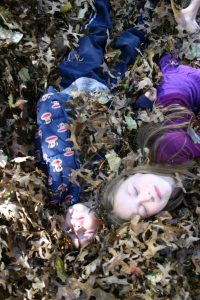 Huh. Interesting. So, what’s my point?
Huh. Interesting. So, what’s my point?
It might help to be aware of it. You can’t use a tool you don’t understand. You can’t avoid a pitfall you don’t see. It might be helpful for you to take stock, now, as we move from the bright, adventurous, warm, light summer to the cool, changing, fragrant, changable, cozy fall. Here are some questions for you.
How does fall make me feel? Emotionally? Physically?
Do I like the fall? Why or why not?
Am I likely to produce more or less in the fall? Why?
What projects are more appealing to me in the fall? Which ones might I avoid?
What do I think my writing will do in the fall? How will my mood and circumstances affect my plots, characters, and tone?
 And in a broader sense, our lives have seasons. They have one big swoop from “spring” (birth) through to “winter” (death), and they have many more subtler iterations, which we often refer to topographically, like a “dessert,” a “valley,” or a “mountaintop.” Where are you? And what are you writing?
And in a broader sense, our lives have seasons. They have one big swoop from “spring” (birth) through to “winter” (death), and they have many more subtler iterations, which we often refer to topographically, like a “dessert,” a “valley,” or a “mountaintop.” Where are you? And what are you writing?


September 26, 2014
Goodreads and Me
 Inevitably, when someone asks me a writer- or reader-question in real life, it is going to end up on the blog. This used to happen with my food blog. The thing is, if someone has taken the time and effort to ask a serious question, there are probably other people wondering the same thing. Plus, a lot of the time, the question just gets me thinking, and then researching, and then I know so much I just burst out into my blogspace.
Inevitably, when someone asks me a writer- or reader-question in real life, it is going to end up on the blog. This used to happen with my food blog. The thing is, if someone has taken the time and effort to ask a serious question, there are probably other people wondering the same thing. Plus, a lot of the time, the question just gets me thinking, and then researching, and then I know so much I just burst out into my blogspace.
And I am so terrible at speaking impromptu, like in normal life. So now that I have processed…
The question was: Have I tried Goodreads as an author, and how has that worked out? (In reality, this question was directed at a group of writers, but I was the author with perhaps the most online presence, so I tried to answer.)
Goodreads prides themselves on many things. The reality is that they are a ginormous gathering place for book titles, reviews, and readers. They also claim to be a great place for authors to host forums, events, and put their information out there. (And they also have myriad book clubs and lists, but I won’t answer to any claims about those, here.)
To be brutally honest, I don’t find Goodreads to be a great way to generate interest in me or my books, which may be why many writers don’t host their own page there. On the other hand, I do maintain my page, in hopes that someday people will look for me there, and when they do…
Well, that and these reasons.
I like to spread it around. The theory behind many modern publicity campaigns is this: be everywhere! These days, you can even adopt that policy without spending money. Sure, it would cost money to put ads in The New York Times, on a billboard in your town, or even on the sidebar of Goodreads, but what we’re talking about here is building a long, consistent web presence so that someday, if someone Googles you, bam!, you are there. Or if some random reader is surfing blogs, bam!, there’s your highly interesting guest post. Or if the search words “awesome book” are typed in, bam!, there’s your viral vlog from your book release. Like five years ago. Which, besides economy, is one of the best things about slowly and surely taking the web by storm: it sticks around. Billboards change.
You might as well have information, and plenty of it, on one of the biggest book and reader sites in the world. People use Goodreads. I am still not totally sure just what they do there in droves, but I am pretty sure it has to do with reading and writing reviews. In other words, you want your book there so it can get reviews. And then, alongside those reviews, it wouldn’t hurt to have some accurate and flattering information, complete with hyperlinks to your charming corner of the blogosphere and purchasing links. This sort of approach wouldn’t take much maintenance, just a day or so making your author page look real nice and then updates every time you come out with a new book.
Blog feed. I feed my blog anywhere it will feed, basically. Why? Why not? It does all the work for me. Goodreads is a great place to feed your blog and forget about it. Plus, it makes your author page seem very updated when you keep those blog posts rolling. And you forgot it was even there…
Review of other books. I review books for The Starving Artist, obviously. In fact, I review more than forty books per year. There is no reason that I can think of that I would not slide those reviews over to Goodreads. Then, at the end of each review, I write, “***THIS REVIEW WAS WRITTEN FOR THE STARVING ARTIST BLOG.” Look it up. You’ll find me. Then you’ll find out I am interesting and can write. Then you’ll find a book of mine that you can’t say no to. Then you’ll buy it. (At least that’s the idea.)
Giveaways, or Want to Reads. This is the caveat to my saying that Goodreads has not gotten me much attention from readers. Whenever I have a Giveaway, I get literally thousands of readers noticing my book. I get hundreds of people who tag it “Want to Read.” I can’t say how this has translated into sales, but I also can’t negate all those eyes looking at my cover and reading the description. Plus, I know of at least a few people who now have the book in their hands, people who generally use reviewer services, ahem, Goodreads.
I have been much less successful getting people interested during blog tours, Q and As, and events. Like almost no one notices those, every single time I list one. In fact, I’m pretty sure that it depresses me, making me a slightly less efficient author.
So that’s the longer answer to the question. We’ll cut it off there. I like Goodreads for a pretty and updated author page linked to your books. I like it for Giveaways. And I like to post my reviews there because I write them anyhow. The moral: don’t be afraid of putting some minor effort into a presence on Goodreads, but never–oh never–put all your eggs in one basket.


September 22, 2014
Book Review: The Hero with a Thousand Faces
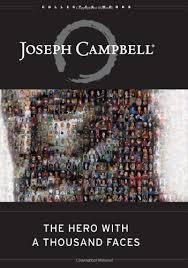 The Hero With a Thousand Faces, by Joseph Campbell and published in the third edition by New World Publishing in 2008. The original was published in 1949 by Pantheon Books.
The Hero With a Thousand Faces, by Joseph Campbell and published in the third edition by New World Publishing in 2008. The original was published in 1949 by Pantheon Books.
Before I begin my review of this particular book, I want to answer a question for those of you who don’t know the answer. What is the “hero’s journey?” The hero’s journey–also known as the monomyth–is a widely distributed, perhaps universal, pattern in the narratives of the world, throughout time. Joseph Campbell pinpointed and explored the concept, culminating his studies and teachings in The Hero With a Thousand Faces. He proposed that myths throughout history and space share fundamental structures and stages, which he enumerated in the book. These stages are known today as the hero’s journey. The concept is still studied and used, and has vehement opposition and staunch followers, but mostly, I think, an army of in-between writers and readers who are affected, consciously or otherwise, by Campbell’s game-changing approach to story.
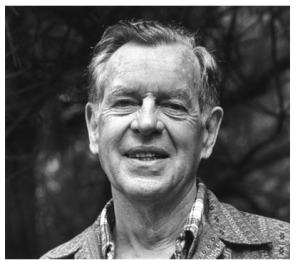 Joseph Campbell (1904-1987) was a lecturer and mythologist who was known for his work in comparative mythology and religion. Although he was skilled in athletics (especially running) and the hard sciences, he was drawn to the humanities. He had degrees in English and Medieval Literature, and studied various languages in Europe. After a chance meeting of an Indian man, Campbell became interested in Hinduism. He spent the Great Depression holed up with his books in a shack in upstate New York, and the time afterward hob-knobbing with some California literary elite. He became a professor at Sarah Lawrence college and lived with his wife in Greenwich Village. In the 50s, he took a trip to India and Asia, which strengthened his interest in comparative mythology and religion, and he spent the rest of his life lecturing to the layman about it.
Joseph Campbell (1904-1987) was a lecturer and mythologist who was known for his work in comparative mythology and religion. Although he was skilled in athletics (especially running) and the hard sciences, he was drawn to the humanities. He had degrees in English and Medieval Literature, and studied various languages in Europe. After a chance meeting of an Indian man, Campbell became interested in Hinduism. He spent the Great Depression holed up with his books in a shack in upstate New York, and the time afterward hob-knobbing with some California literary elite. He became a professor at Sarah Lawrence college and lived with his wife in Greenwich Village. In the 50s, he took a trip to India and Asia, which strengthened his interest in comparative mythology and religion, and he spent the rest of his life lecturing to the layman about it.
I came at Campbell (at least consciously) through a more modern portal. It began with a reading of Christopher Vogler’s The Writer’s Journey, which may well be a more widely read reinterpretation, these days. And the reason I read that was as fodder for a writing experiment of my own. The idea of a monomyth intrigued me. So I came up with a writing challenge (with the help of Camp NaNoWriMo) to write 50,000 words of a new novel during the month of April and base it entirely off of the hero’s journey. I wanted to know, could plugging the most obvious characters, setting, and situation into a very basic story frame result in a book that people would actually and truly love? And while I was at it, could I improve my plot-creation skills? The result is the half-written novel, The Journey of Clement Fancywater, which will probably be seeing publication around New Years, because darned if I didn’t write something somewhat innovative despite myself. And I sincerely hope I know my way around a plot a little better, as well.
As for reading the two books, well let’s just say I was seldom riveted. Most people consider Campbell’s views (and especially his love affair with Freudian and Jungian psychology) to be outdated, care-worn, or, even worse, out of fashion. I found the whole pre-Bahai religious mishmash to be ehn. (Although I felt like I was touching on the roots of a thing–a religious movement–that is spreading further and further with time, outward from Hollywood, outward from Campbell and his contemporaries.) His writing is pretty darn boring, brought to life only in his slightly wooden retelling of ancient myths and the random, startlingly beautiful sentence. I mean, I love reading all those old stories, and they gave me idea after idea for my own writing. But somehow, despite all the sex and gore and the sensationalism of lumping Jesus and Krishna into the same psycho-social extension, it was repetitive, disorganized, and–did I already say this?–dry.
I was also unsure, at times, if Campbell was telling me what the universal myths reveal, or about his new religion based on the myths. In other words, is he a scientist or a humanist? And in no way does he simply lay out the stages of the journey. If you want that, you’ll have to look to later books by others, or the internet. Sure, the book is written in the stages, but it is a meandering read, void of charts and diagrams where it abounds in (often creepy and/or lewd) ancient art. Also, feminists will (as usual) find fault with his male hero and the relationships between the hero and the other characters/the world. It might help to read it thinking of “feminine” and “masculine” instead of “female” and “male,” but that presupposes the modern reader even believes in femininity and masculinity. (I do.)
Perhaps I am being harsh. Perhaps I feel like I am being harsh because so many people seem to be so harsh with this book. At this time, it’s the kind of thing most people will read to appreciate its profound influence on modern culture, modern storytelling, and, well, Star Wars. And there are those who will also read it, still, and buy it hook, line and sinker and compare themselves right out of all of the world’s religions and into Campbell’s bliss of universality. I’m not one of them. But I still appreciate a great story, and I still appreciate dissecting the world’s narratives into generalizations and truths. For me, the engaging, smart book to do this really well has not been written, but it would stand on the shoulders of Campbell and Vogler, for better or for worse.
__________
“It will always be the one, shape-shifting yet marvelously constant story that we find, together with a challengingly persistent suggestion of more remaining to be experienced than will ever be known or told” (p1).
“Religions, philosophies, arts, the social forms of primitive and historic man, prime discoveries in science and technology, the very dreams that blister sleep, boil up from the basic, magic ring of myth” (p1).
“For the symbols of mythology are not manufactured; they can not be ordered, invented, or permanently suppressed. They are spontaneous productions of the psyche” (p1-2).
“The latest incarnation of Oedipus, the continued romance of Beauty and the Beast, stand this afternoon at the corner of Forty-second Street and Fifth Avenue, waiting for the traffic light to change” (p2).
“Full circle, from the tomb of the womb to the womb of the tomb, we come” (p8).
“And looking back at what had promised to be our own unique, unpredictable, and dangerous adventure, all we find in the end is such a series if standard metamorphoses as men and women have undergone in every quarter of the world, in all recorded centuries, and under every odd disguise of civilization” (p8).
“The hero is the man of self-achieved submission” (p11).
“Only birth can conquer death…” (p11).
“Dream is the personalized myth, myth the depersonalized dream” (p14).
“Modern literature is devoted, in great measure, to a courageous, open-eyed observation of the sickeningly broken figurations that abound before us, around us, and within” (p20).
“The effect of the successful adventure of the hero is the unlocking and release again of the flow of life into the body of the world” (p32).
“Freud has suggested that all moments of anxiety reproduce the painful feelings of the first separation from the mother…” (p44).
“One has only to know and trust” (p59).
“The idea that the passage of the magical threshold is the transit into a sphere of rebirth is symbolized in the worldwide womb image of the belly of the whale” (p74).
“The meaning is that the grace that pours into the universe through the sun door is the same as the energy of the bolt that annihilates and is itself indestructible” (p124).
“…Man can not measure the will of God, which derives from the center beyond the range of human categories” (p126).
“…then he becomes free of all fear, beyond the reach of change” (p127).
“Instead of clearing his own heart, the zealot tries to clear the world” (p134).
“The perennial agony of man, self-torturing, deluded, tangled in the net of his own tenuous delirium, frustrated, yet having within himself, undiscovered, absolutely unutilized, the secret of release…” (p137).
“…These are all the children, the mad figures of the transitory yet inexhaustible, long world dream of the All-Regarding, whose essence is the essence of Emptiness…” (p137).
“We and that protecting father are one. This is the redeeming insight. That protecting father is every man we meet” (p137).
“…both the male and the female are to be envisioned, alternately, as time and eternity. That is to say, the two are the same…” (p145).
“‘All of these visualized deities are but symbols representing the various things that occur on the Path'” (p155).
“Immortality is then experienced as a present fact: ‘It is here! It is here!'” (p161).
“Nevertheless–and here is a great key to the understanding of the myth and symbol–the two kingdoms are actually one” (p188).
“…so the poet and the prophet can discover themselves playing the idiot before a jury of sober eyes” (p189).
“‘For then alone do we know God truly,’ writes Saint Thomas Aquinas, ‘when we believe that He is far above all that man can possibly think of God'” (p202).
“A realization of the inevitable guilt of life may so sicken the heart that, like Hamlet or Arjuna, one may refuse to go on with it. On the other hand, like most of the rest of us, one may invent a false, finally unjustified, image of oneself as an exceptional phenomenon in the world, not guilty as others are, but justified in one’s inevitable sinning because one represents the good” (p205).
“In the later stages of many mythologies, the key images hide like needles in great haystacks of secondary anecdote and rationalization…” (p213).
“With their discovery that the patterns and logic of fairy tale and myth correspond to those of dream, the long discredited chimeras of archaic man have returned dramatically to the foreground of modern consciousness” (p219).
“Mythology, in other words, is psychology misread as biography, history, and cosmology” (p219).
“For they actually touch and bring into play the vital energies of the whole human psyche” (p220).
“The gods are symbolic personifications of the laws governing this flow [of the universal round]” (p223).


September 11, 2014
Series Review: Doctor Proctor
 The Doctor Proctor’s Fart Powder series for kids, by Jo Nesbo. Currently, there are four books in the series. I read them in English translation by Aladdin Books, 2007-2012, illustrated by Mike Lowery.
The Doctor Proctor’s Fart Powder series for kids, by Jo Nesbo. Currently, there are four books in the series. I read them in English translation by Aladdin Books, 2007-2012, illustrated by Mike Lowery.
The series includes:
Doctor Proctor’s Fart Powder
Bubbles in the Bathtub (Doctor Proctor’s Time Traveling Bathtub)
Who Cut the Cheese? (The End of the World, Maybe)
The Magical Fruit (The Great Gold Robbery)
It’s easy to tell what the schtick is with these books: as much potty humor as can be stuffed into a kids’ series without going over the line. Well, mostly without going over the line. There are lots of scenes in the sewers, baboons (just think of their rears), and always the appearance of the fart powder. In other words, these books are meant for boys and Nesbo has his finger on the pulse of boys’ humor.
They are Norwegian, as Nesbo is Norwegian, and are translations of the original (which is why they have alternate titles). And by Norwegian, I mean they very strongly give a sense of place and of Norway. You never wonder where you are. They are constantly tongue-in-cheek, with some outright humor and lots of punny references to real things (like the Rotten Ham football team or Madame Tourette’s Wax Museum). Nilly (a diminutive red-head), Lisa, and the wacky inventor Doctor Proctor live in the three primary-colored houses at the end of Cannon Avenue, and they form a relationship the begins over the failed fart powder. The first book is mostly about more simple things, like school bullies an an anaconda that lives under Oslo, but the rest of the books move further afield into outrageous adventures through time, throughout Europe, in dealing with aliens, and eventually make them king-appointed spies.
Jo Nesbo did not begin as a children’s author. He was already a best-selling author–the best in Norway, actually–with crime novels translated into forty languages, before he started Doctor Proctor. He is known for the Harry Hole series and several of his books are coming into movie and TV syndication in the near future.
 As for Fart Powder, I have really mixed feelings. For one, my reading of the series was so not a normal reading. I read them out loud to my kids and it therefore took us forever. Also, I sometimes missed bits when Dad or Aunt or Grandma read to the kids. But not much. Second and third, the series is a very middling type; middle of great and not-so-great (quality-wise), and middle of inappropriate and appropriate. There were times when I thought, “We are so over this,” and considered putting the series down. There were other times when I just wanted to keep Nilly around. Maybe adopt him.
As for Fart Powder, I have really mixed feelings. For one, my reading of the series was so not a normal reading. I read them out loud to my kids and it therefore took us forever. Also, I sometimes missed bits when Dad or Aunt or Grandma read to the kids. But not much. Second and third, the series is a very middling type; middle of great and not-so-great (quality-wise), and middle of inappropriate and appropriate. There were times when I thought, “We are so over this,” and considered putting the series down. There were other times when I just wanted to keep Nilly around. Maybe adopt him.
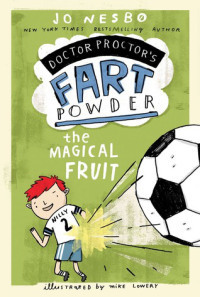 At its best, the series is sparkling and surprising magic realism, a place to go away and make no assumptions, to believe in moon chameleons and balancing shoes, and to giggle about farts, butts, and nudity. At its worst, it steps over the line–or at least my line–and I found myself verbally editing out words and phrases and reminding myself that my kids can’t actually read this by themselves until they are older. I mean, Yodolf Stahler (play on Adolph Hitler)? And the occasional cuss word? And a few creatures and situations that are sincerely terrifying to children? Etc.
At its best, the series is sparkling and surprising magic realism, a place to go away and make no assumptions, to believe in moon chameleons and balancing shoes, and to giggle about farts, butts, and nudity. At its worst, it steps over the line–or at least my line–and I found myself verbally editing out words and phrases and reminding myself that my kids can’t actually read this by themselves until they are older. I mean, Yodolf Stahler (play on Adolph Hitler)? And the occasional cuss word? And a few creatures and situations that are sincerely terrifying to children? Etc.
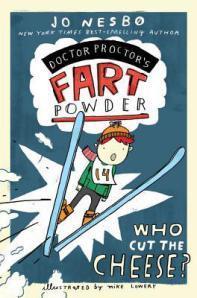 I also had to struggle with letting my kids read potty humor, at all. Honest to goodness, it’s not that I mind it, it’s just that society does. How can I explain to Eamon that he must stop saying “butt” in school (after yet another note) when we’re laughing away at it, at home? It’s sticky. You want them to enjoy, but you don’t love society rejecting them, telling them they are bad, or creating these sorts of conundrums. Just walk up and say “Fart!” to an elderly person and see what happens.
I also had to struggle with letting my kids read potty humor, at all. Honest to goodness, it’s not that I mind it, it’s just that society does. How can I explain to Eamon that he must stop saying “butt” in school (after yet another note) when we’re laughing away at it, at home? It’s sticky. You want them to enjoy, but you don’t love society rejecting them, telling them they are bad, or creating these sorts of conundrums. Just walk up and say “Fart!” to an elderly person and see what happens.
Not to mention the violence. Along with the fantastic situations (orbiting the Earth with the help of flatulence, traveling through time in a bath tub), come the fantastic negative situations, like being eaten by a giant anaconda, grilled alive on a giant waffle maker, etc. At one point, my kids asked me to discontinue because one of them was scared, but when I kept reading the book silently, they returned.
Also, I hate when books are falsely long. I mentioned this in my Sisters Grimm review. Proctor (at least the Aladdin version) contains giant spaces between the words and massive margins, I can only imagine because the publisher was trying to reincarnate Harry Potter. It’s obnoxious.
And one more hurdle: Nesbo has a very distinctive writing style (at least in these books) that can make reading him difficult. He is in love with the run-on sentence. He is also very fond of making his characters stutter in dialogue. The first thing I found mostly charming, the second annoyed me so much I edited it out after awhile. As far as his language goes (in translation, at least), it is at its best playful, at its worst, distracting or–heaven forbid–mediocre.
This whole review reminds me, though, of what could be said about Roald Dahl and his books (Matilda, Charlie and the Chocolate Factory, The Twits, The Witches, James and the Giant Peach, The BFG, etc.). I love Roald Dahl. And yet, he is everything bad that could be said about Nesbo (crass, violent, scary) except for distracting. His writing is superb and much cleaner than Nesbo’s (or my own, for that matter). In fact, Nesbo’s books definitely have a very Dahl feel to them, which has often been imitated but very seldom replicated. I really enjoy the Mister Magorium’s Wonder Emporium mood, and I think plenty of other readers do, too. It’s an approach to writing and reading that embraces fantasy and suspension of reality, where anything goes, and the more coveted, the better (and we’re talking childhood fantasies here, like a chocolate factory with tiny people whipping the cows, or neighbors that are secretly witches).
So, in the end, I can’t really condemn Nesbo for working toward–at times–the darker side of childhood while also making their desires come alive on the page. I ended up most invested in Nilly, and found many of the other characters flat. (I never could completely picture Doctor Proctor or Juliette Margarine in my head.) But they were fun. And I snickered and chortled with the best of them at all the physical humor. Plus, the fourth book ended up being the best. So, there’s that to look forward to.
________________
 There was a movie released in March, in Norway, in Norwegian. Too bad, because it looks pretty good and quite true to the spirit of the series. Perhaps they will subtitle (which leaves the problem of kids and subtitles) or remake it. I detest dubs unless they are a particular type of animation. It is not currently available to us English-speakers.
There was a movie released in March, in Norway, in Norwegian. Too bad, because it looks pretty good and quite true to the spirit of the series. Perhaps they will subtitle (which leaves the problem of kids and subtitles) or remake it. I detest dubs unless they are a particular type of animation. It is not currently available to us English-speakers.
The official website can be found here, but it is, sadly, nothing much, whereas Nesbo’s grown-up official page is here and is much more informative.


September 9, 2014
WattPad Launch
 What is Wattpad? In theory, many of you don’t need to be told, because, after all, it has 25,000,ooo users. In reality, however, I have found not a single person who knew what I was talking about at the word “Wattpad.”
What is Wattpad? In theory, many of you don’t need to be told, because, after all, it has 25,000,ooo users. In reality, however, I have found not a single person who knew what I was talking about at the word “Wattpad.”
I had read a blurb about Wattpad in some sort of What’s New? section of, I think, Poets and Writers, maybe last year. I dog-eared the page, and then forgot about it. But a couple months ago I went to my writing group and one of the guys at the table presented the idea for at least one of us to tackle Wattpad and see if it got us any added attention. Two of them (they are housemates) had spent some time surfing Wattpad and gave an explanation of their findings and observations. Now, I was on my summer sabbatical, taking care of kids, cleaning the house, and camping, so I sort of blew it off. For like a second. Because I am one of those people that hears “someone should do this” as “Devon, do this.” So, while passengering up to New York at the end of July, I set a pen and my ideas notebook in my lap and closed my eyes and wondered, what would fit this format?
Pause for the format. Wattpad describes themselves as “a place to discover and share stories: a social platform that connects people through words. It is a community that spans borders, interests, languages. With Wattpad, anyone can read or write on any device: phone, tablet, or computer.” Wow, that’s vague. Basically, it is place to read free books or short stories in a serialized format which notifies you as a story unfolds. The concept is very modern and cool. (I think the issue is finding a great book just as it is unfolding. Perhaps in the future they will have a way to re-serialize old content, but that won’t be quite as exciting.) In other words, you log in, you stick the app on your device (or not), you search amongst millions of books and stories, and you follow ones that interest you. As the author posts additions (usually in short sections, sometimes chapters), you are notified via your device or your account. Then you can click and read in short spurts.
See? Very modern and cool.
But no one in my writing group was willing to sacrifice an idea they were already committed to or in love with to try out a new format which would also, by the way, not make any income. (But garner interest in us as authors? Drive users to our blogs and books? Yes, hopefully.)
So there I am, zipping up the east coast with my eyes closed, searching the music in my earbuds and the recesses of my brain for an idea. Which came, but from The Hero with a Thousand Faces (more on that, to come). The best thing about Hero is reading all the old, world folktales (again, more on that to come), and King Midas ended up inspiring me in just the right way.
Finding inspiration for Wattpad can’t just be what you have on hold for a novel, anyhow. It appears in real-time, as you write each new section, which means several things: 1) Each small section has to be gripping and suspenseful. 2) You have to know approximately where you are headed from the beginning, and introduce things right out of the gate that won’t be used until later. 3) Audiences won’t expect (or notice) quite as much cohesion as in a real novel, and yet, you don’t want to pull a Roseanne‘s Becky on them. And 4) Think TV versus movie. It’s different in texture and content, in layout and subject matter, partly because it needs to be.
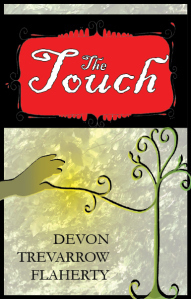 Here is the schtick for my new Wattpad serial novel, The Touch:
Here is the schtick for my new Wattpad serial novel, The Touch:
Jack and his fiancee Goldie are the only things actually big about the town of Gargantuan, Indiana. That is, until their wedding day, when Jack cashes in on a wish by turning everything he touches to gold, destroying the town, his marriage, and anything once recognizable about his life. Eighteen years later, a bitter young woman running away from her problems stalls out on the hidden borders of the dusty, legendary town. She wanders in looking for a hiding place but ends up finding so much more.
Serialized novel released at a section each Monday.
So, check out Wattpad. Follow someone (or me!) and read their stuff. Throw something of yours up there if you have stuff to throw up there. And here’s to hoping The Touch will be as good on Wattpad as it is in my head. Here’s to hoping the serialized format of real-time writing will work for me, as a writer. And here’s to the future. Knock, knock. It’s here.


September 5, 2014
Laugh On Hold
It’s not easy to find a good laugh. But I often find myself thinking, “I sure could use a good laugh.” Comedy is tough business, which is why most nights when I go looking to laugh all I end up with is crossed eyes from an optical illusion and an urban definition for the phrase “throw shadow.” Oh why can’t I read that “Making Fun of Anthropologie” article and laugh as hard the second, or third, or tenth time? Comedy is quick business, too.
 Which is why I am wondering why I didn’t include comedy in my Best Books list. I guess I don’t usually think of reading comedy (as opposed to watching it). I can’t tell you any comedy books I have read. Perhaps Haven Kimmel’s Girl Named Zippy and She Got Up Off the Couch. I have meant to read Me Talk Pretty One Day for years of NPR listening, but I just never have. I think, deep down, I consider comedy writing to be somehow inferior. Despite the fact that it might be one of the hardest things to write. Despite the fact that I sure could use a good laugh.
Which is why I am wondering why I didn’t include comedy in my Best Books list. I guess I don’t usually think of reading comedy (as opposed to watching it). I can’t tell you any comedy books I have read. Perhaps Haven Kimmel’s Girl Named Zippy and She Got Up Off the Couch. I have meant to read Me Talk Pretty One Day for years of NPR listening, but I just never have. I think, deep down, I consider comedy writing to be somehow inferior. Despite the fact that it might be one of the hardest things to write. Despite the fact that I sure could use a good laugh.
 What happened is Private Parts popped up on my TBR (like for a year from now). And I thought, heck no, and then I looked into it and actually it’s supposed to be a great book. Like moving. And funny. And surprising. So–in like a year from now–I guess I’ll give it a shot, partly because it sounds so good to read and laugh. And that made me wonder, why didn’t I put comedy on the TBR? As a matter of fact, why don’t I read comedy? (The TBR includes YA, general, literary, classics, theology and religion, philosophy, and fantasy. Actually, that makes me wonder why I didn’t include memoirs, nonfiction, and history, because I like a good one of those, too.)
What happened is Private Parts popped up on my TBR (like for a year from now). And I thought, heck no, and then I looked into it and actually it’s supposed to be a great book. Like moving. And funny. And surprising. So–in like a year from now–I guess I’ll give it a shot, partly because it sounds so good to read and laugh. And that made me wonder, why didn’t I put comedy on the TBR? As a matter of fact, why don’t I read comedy? (The TBR includes YA, general, literary, classics, theology and religion, philosophy, and fantasy. Actually, that makes me wonder why I didn’t include memoirs, nonfiction, and history, because I like a good one of those, too.)
So I did a little online research. (Isn’t that what “research” implies, anymore?) And I came up with a list of best comedy books synthesized from here and there. I was not surprised that I had read almost none of them but had heard of many of them. And the funny thing is (funny peculiar, not funny ha-ha) that I am still reluctant to add them to my TBR and stir them in with War and Peace and Of Mice and Men. I mean, isn’t looking to laugh somehow inferior to literary enlightenment? Pah! (I do, however, pause at this: it is entirely possible that many of these books pull from the baser human tendencies in order to be funny. I do have a line. And comedians often cross it. Then again, finding superb, clean comedy is so rewarding, just like finding a superb, clean show or movie these days makes it extra special.)
It’s a long list, but somebody had to do it. Maybe I’ll just scoot over here and pick up one of these whenever I just really need it.
20
 30, Albert Brooks
30, Albert BrooksAmerica, Jon Sterwart
The Areas of My Expertise, John Hodgman
The Ascent of Rum Doodle, W. E. Bowman
Assassination Vacation, Sara Vowell
A Bad Idea I’m About to Do, Chris Gethard
The Beastly Beatitudes of Balthazar B, J. P. Donleavy
The Bedwetter, Sarah Silverman
Blue Boy, Rakash Satyal
The Bottle Factory Outing, Beryl Bainbridge
Born Standing Up, Steve Martin
Bossypants, Tina Fey
Th
 e Boy Who Never Slept and Didn’t Have To, D. C. Pierson
e Boy Who Never Slept and Didn’t Have To, D. C. PiersonBreakfast of Champions, Kurt Vonnegut
Bridget Jones’ Diary, Helen Fielding
The Broke Diaries, Angela Nissel
Catch-22, Joseph Heller
The Code of the Woosters, P. G. Wodehouse
Cold Comfort Farm, Stella Gibbons
Comedy at the Edge, Richard Zoglin
The Comedy Writer, Peter Farrelly
The Commitments, Roddy Doyle
 A Confederacy of Dunces, John Kennedy Toole
A Confederacy of Dunces, John Kennedy TooleCrooked Little Vein, Warren Ellis
Daddy’s Boy, Chris Elliott
Dangerously Funny, David Bianculli
Dave Berry Slept Here, Dave Berry
Decline and Fall, Evelyn Waugh
The Diary of Nobody, George Grossmith and Weedon Grossmith
Essays of E. B. White, E. B. White
Fraud, David Rackoff
Gargantua and Pantagruel, Francois Rebelais
Gasping for Airtime, James Mohr
 Girl Walks Into a Bar, Rachel Dratch
Girl Walks Into a Bar, Rachel DratchGod, If You’re Not Up There, I’m F**cked, Darrel Hammond
Good Omens, Neil Gaiman and Terry Pratchett
Going Too Far, Tony Hendra
Great Comedians Talk About Comedy, Larry Wilde
Happy Accidents, Jane Lynch
And Here’s the Kicker, Mike Sacks
The History Man, Malcolm Bradbury
The Hitchhiker’s Guide to the Galaxy, Douglas Adams
How I Became a Famous Novelist, Steve Hely
 How to Be a Woman, Caitlin Moran
How to Be a Woman, Caitlin MoranHow to Sharpen Pencils, David Rees
Humblebrag, Harris Whittels
I Am America (and So Can You!), Stephen Colbert
I Feel Bad About My Neck, Nora Ephron
I Didn’t Ask to be Born, Bill Cosby
I Don’t Care About Your Band, Julie Klausner
I Like You, Amy Sedaris
I Love You More Than You Know, Jonathan Ames
I’m Dying Up Here, Willam Knoedelseder
The Importance of Being Ernest, Oscar Wilde
Ire
 ne Iddlesleigh, Amanda McIttrick Ros
ne Iddlesleigh, Amanda McIttrick RosIs Everyone Hanging Out Without Me?, Mindy Kaling
John Dies At the End, David Wong
Kasher in the Rye, Moshe Kasher
Kick Me, Pail Feig
Kill Your Friends, John Niven
Lamb, Christopher Moore
The Late Shift, Bill Carter
A Liar’s Autobiography, Graham Chapman
The Life and Opinions of Tristan Shandy, Gentleman, Laurence Sterne
Live From New York, Tom Shales and James Andrew Miller
 Let’s Pretend This Never Happened, Jenny Lawson
Let’s Pretend This Never Happened, Jenny LawsonLost in the Funhouse, Bill Zehme
Lucky Jim, Kingsley Amis
The Loved One, Evelyn Waugh
M*A*S*H, Richard Hooker
Me Talk Pretty One Day, David Sedaris
Molesworth, Geoffrey Willans and Ronald Searle
Mr. Mike, Dennis Perrin
My Horizontal Life, Chelsea Handler
An Object of Beauty, Steve Martin
On the Real Side, Mel Watkin
 The Onion Book of Knowledge, The Onion
The Onion Book of Knowledge, The OnionPnin, Vladimir Nobokov
Porterhouse Blue, Tom Sharpe
Portnoy’s Complaint, Philip Roth
The Princess Bride, William Goldman
The Pro, Garth Ennis
Puckoon, Spike Milligan
Things My Girlfriend and I Have Argued About, Mill Millington
Queen Lucia, E. F. Benson
Running With Scissors, Augusten Burroughs
SCTV, Dave Thomas
The Second City Almanac of Improvisation, Anne Libera
 Show Me the Funny!, Peter Desberg and Jeffrey Davis
Show Me the Funny!, Peter Desberg and Jeffrey DavisSide Effects, Woody Allen
Someone Could Get Hurt, Drew Magary
Sleepwalk With Me, Mike Birbiglia
The Stench of Honolulu, Jack Handey
The Sugar Frosted Nutsack, Mark Leyner
Tasteful Nudes, Dave Hill
Thank You, Jeeves, P. G. Wodehouse
This Is Where I Leave You, Jonathan Tropper
There Is a (Slight) Chance I Might Be Going to Hell, Laurie Notaro
Three Men In a Boat, Jerome K. Jerome
 The Ultimate Hitchhiker’s Guide to the Galaxy, Douglas Adams
The Ultimate Hitchhiker’s Guide to the Galaxy, Douglas AdamsWake Up, Sir!, Jonathan Ames
A Walk in the Woods, Bill Bryson
The War for Late Night, Bill Carter
What a Carve Up!, Jonathan Coe
Where’d You Go Bernadette, Maria Semple
The Will to Whatevs, Eugene Mirman
Without Feathers, Woody Allen
You’re Lucky You’re Funny, Phil Rosenthal
You’re Not Doing It Right, Michael Ian Black
Zombie Spaceship Wasteland, Patton Oswalt


September 3, 2014
The Future Is Here
I want you guys to take a look at something. It’s an online preview of a novel written by a friend/fellow writer, Matthew Talamini. I can’t show it to you here, which you’ll understand as soon as you see it. So follow this link and then come back.
Yeah, it is really cool. And it is incredibly possible that we will eventually see books this way on a regular basis. Blows the mind. Already, some magazines and newspapers are offering articles like it. (I don’t believe there has ever been an entire book like this, however, which leads me to…)
 What I want you to notice, besides the envy and worry rising in your little writer/reader/publisher heart (embrace what comes, people!), is the innovation. The forward-thinking. The sweat and blood that began with a crazy dream, a dream that made sense with the future. No, not all of us–or perhaps any of us reading this–have the unique talents and abilities to make a flying-bits website (that’s a technical term, there), but I would think that we each have some skill set that would enable us to embrace something about the future and jump on the bandwagon early.
What I want you to notice, besides the envy and worry rising in your little writer/reader/publisher heart (embrace what comes, people!), is the innovation. The forward-thinking. The sweat and blood that began with a crazy dream, a dream that made sense with the future. No, not all of us–or perhaps any of us reading this–have the unique talents and abilities to make a flying-bits website (that’s a technical term, there), but I would think that we each have some skill set that would enable us to embrace something about the future and jump on the bandwagon early.
I suppose that’s why it’s important to keep up with the field. Keep reading trade mags and trade books. Keep reading books in your genre. Pay attention to what is happening online, in the news, in other media. And then create. Brainstorm. Dream. Meander a little. You see, one of the coolest things about indie-/self-publishing is the ability to move so much faster than traditional publishing. Yes, it does take time to write something, edit something, and get it out there, but meantime Simon and Schuster is sitting on some great idea with their finger in their nose and you’ve just gone from conception to publication in less than a year. Which makes us, the indie people, the perfect candidates for seeing a trend or a need or a desire or a technology in the culture and bam! delivering.
Not that Talamini is going the indie route. But even authors looking for book deals have to cobble together their own platform, nowadays. (We’ve gone over and over this.)
Because sometimes it pays just to be the first person doing something.
And sometimes it pays to do something really well.
And sometimes it takes both, multiple times, and perspiration and time and luck. So go on out there and write an entire book without the letter E, or address the increasingly tenuous profession of journalist to the Middle East. I’m jumping on the Wattpad bandwagon, vlogging, and pitching a concept for parallel novels to some friends. Just do it fast, and take yourself seriously, and finish what you start. Talamini’s site didn’t just make itself, you know.


August 26, 2014
Book Review: Principia
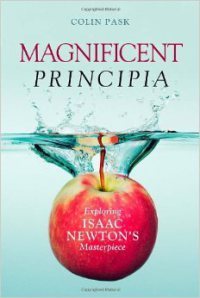 Magnificent Principia (2013), by Colin Pask, as a way to read–without actually reading–Isaac Newton’s The Principia, or more correctly, Philosophiæ Naturalis Principia Mathematica or Mathematical Principles of Natural Philosophy, 1687 (last edition, 1726). To be more exact, Magnificent does contain the important bits and chunks of Principia, although what percentage I am not at all clear on, and it digests it those chunks for the “general” reader.
Magnificent Principia (2013), by Colin Pask, as a way to read–without actually reading–Isaac Newton’s The Principia, or more correctly, Philosophiæ Naturalis Principia Mathematica or Mathematical Principles of Natural Philosophy, 1687 (last edition, 1726). To be more exact, Magnificent does contain the important bits and chunks of Principia, although what percentage I am not at all clear on, and it digests it those chunks for the “general” reader.
Despite my attainment of a passing grade on the cusp of calculus in high school and my general smarts, I thought that a centuries-old math and dynamics tome would be a bit over my head (at least for leisure reading). I must have been right, because even the primer that I chose was over my head, or at least at times confusing and at others snorable. I mean, even the basic language and references that Pask uses to explain Newton to the “general” public is hardly the language of the everyman. Inertial mass? Point mechanics? Linearly superposed? (Actually, most of my confusion sprang from words that I know the definition of, like velocity or mass, but which were used with much more nuanced and specific scientific meaning.) For whole paragraphs of technical reference I would *zone out* until it was over and I could catch Pask on the next paragraph. Oh, Newton is important, hmmm? You don’t say. Uh-huh. Mm-hmm. I get that.
Which means, honestly, I don’t have much to say about the book itself (either one). Let’s be honest: in fact, I didn’t even completely absolutely finish it. What I can offer you instead is a warning. Yeah, go ahead and make that list of best and most influential books in the world, but consider leaving off the technical bits. I think Newton for Dummies might have enriched my life a little bit more than going cross-eyed over the level-Z math hiding behind a meltingly beautiful cover. Or perhaps one of those science-in-ten-minutes series or coffee table classics. Or a board book, like they make for Poe and Austen. You know, where you can gum the edge without ruining it.
Now let’s run through a little history before I give my brief review.
The Principia is considered by many to be the single most important work of scientific (history) writing, or one of the two most important books on natural science with The Evolution of Species. Some consider Newton’s work to be the beginning of science, or at the very least a synthesis and rationing of everything that came before him. The Principia was originally three books and includes such groundbreaking material as the laws of motion, a foundation of classical mechanics, the law of universal gravitation, and a derivation of Kepler’s laws of planetary motion. Many of Newton’s assertions and formulas are still used today, and his theories paved the way for such future work as Einstein’s Theory of Relativity, etc. etc.
Isaac Newton was very involved in the scientific and philosophical discourse of his day. He had his friendly, his respectful, and his antagonistic relationships with other (some still famous) scientists and philosophers. He became a fellow of the Royal Society, and a maths professor at Trinity College in Cambridge. His work was in physics, mathematics, optics, astronomy, mechanics, dynamics/motion, geometry, color theory, acoustics, alchemy, Biblical chronology, and even science theory (as in laying out the ground rules for rigorous hypothesis testing). He is a key figure in the scientific revolution and basically invented calculus. My kids know him as the guy who discovered Newtonian fluids, aka Oobleck.
He was born at the turn of the year in 1643, in England. Newton was destined to become a farmer, but some providential changes in his continuing education led him to a love of math and the study of several influential scientists and mathematicians (Des Cartes, Galileo, etc.) under the tutelage of an attentive professor. He was hard-working and unsociable, and his mother’s abandonment of him (for another family) left him a very insecure man with odd quirks of behavior, including rage at criticism, paranoia, and mental breakdowns. He never had his own family. He loved studying for its own sake, and was not concerned with disseminating the information or with fame or fortune (all of which he received). His genius was known and celebrated during his own lifetime. He eventually moved into politics and religion.
As for Colin Pask and his Magnificent Principia, it was published in 2013 and I was actually waiting in line for a copy. It’s not a huge seller, but it seems to be admired in its field. Pask is enthusiastic–even if the writing is dry because how else would you write about the Principia?--and knowledgeable. And darned if he doesn’t sincerely try to reach out to the “general” public. Yes, I keep putting that in quotes. Because it is a quote. And it is laughable. I would definitely recommend this book only if you were some sort of student studying Newton, the Principia, or modern dynamics, mathematics, or a related branch of science. As for the Principia itself, I would recommend felling your gaze onto an original copy somewhere at a library or university near you (look it up), marveling at the changes this document and the man behind it has wrought on modern society, and then go about your day.
 To
To  get a slightly more enjoyable idea of where Newton fits into the scheme of things, you might want to try The Clockwork Universe by Edward Dolnick. If you have some sort of sick wish to understand physics without being forced to, you could start with Basic Physics by Karl F. Kuhn. Or Newton for Dummies.
get a slightly more enjoyable idea of where Newton fits into the scheme of things, you might want to try The Clockwork Universe by Edward Dolnick. If you have some sort of sick wish to understand physics without being forced to, you could start with Basic Physics by Karl F. Kuhn. Or Newton for Dummies.


August 22, 2014
Creative Juices
I have been having such a good time journaling, lately. Now, I have always been a journaler, which is not surprising, as a writer. I have also always been a doodler, which also isn’t surprising, as a visual artist. (I also love photography, which means, taken all together, that my family is going to have one heck of a task sorting through my chronicles after I die.)
I have had a bit of a love-hate relationship with journaling, over the course of my life. It has something to do with the journals themselves, sure. Like when you get one with this beautiful, hand-made paper and then realize that you can’t see ballpoint on it and when you use felt-tip it bleeds through. Or you buy this tremendously appealing, giant, blank book and discover that you are like ten pages of teeny-tiny writing into it like six months later. But the love-hate is more complicated than that. I suppose much of the hate arises from expectations. I expect that I write in it every day. That it look cool. That it have lots of things taped into it. That I fill a journal every year or so. That I finish a journal. That my sketches are Louvre-ready. And since I rarely do any of these things, my disappointment deters me from returning to or from pouring myself into the process.
But journaling is wonderful. I know that I am supposed to say that I realize it is not for everyone, and on some level I agree, but I also very strongly believe that journaling can be a transformative and important process in any person’s life. And since a journal is a book, I am babbling to you about it here, on The Starving Artist.
Because I have found some renewed fun and benefits from a couple of new, c0ncept journals.
Now before I tell you about these new, concept journals, I want to tell you what I think journaling should be, should not be, and what it can do for you. Journaling should be a process of person and medium, where the medium allows the person to regularly process life. Basically, that’s it. Sort of like dreaming, but while one is conscious. Journaling should not be too constrictive, too lofty, or too big a thing. When people ask my advice about journaling (shut up, it has happened lots of times), I tell them to go buy some bound paper that they like–not too big or too small–a writing utensil and some tape, and then put something–read: anything–in the bound paper most days. (Below is a list of what those things might be.) You don’t have to begin with your feelings. You don’t have to spell correctly. You don’t have to even write a word, if that’s how today is going to go. Heck, you don’t even have to start at the front or write upright. But what journaling can accomplish for you, even if you are (supposedly) terrible at it, is this: posterity; relaxation; introspection; the ability to revisit wisdom or learn from folly; a creative outlet; knowing thyself; identifying emotions, feelings, and reactions; processing a complex life in a complex, modern world; bridging the material and spiritual; prioritizing or discovering what is important. And more! No, seriously.
So what could you put in a journal, on any given day?
The date
The weather
A drawing
A piece of life detritus, like a ticket, a flower, or a hair
Your feelings
The events
A prayer
A particularly interesting event
A story
A poem
A really bad poem
A really bad drawing
The really bad weather
Plans
Lists
A note or letter to someone
An answer to a question or multiple questions
An activity based on an outside source, like an activity book
An idea you don’t want to forget
When I decide that there is something too specific that has to go into a journal every day, I kill my intentions. Which is why I love these new ideas:
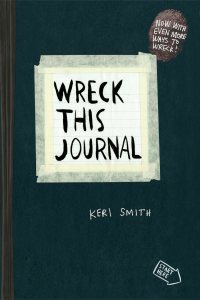 Wreck This Journal, by Keri Smith. Now, this is actually an anti-journal, and you are not going to cover any breadth of soul-searching here, but you are certainly going to tackle both your strictures on journaling and your strictures on a buttoned-up life. (Unless you reinterpret this anti-journal as a self-stroking journal project, which actually plenty of people have done. I guess I am a literalist.) I am maybe ten activities in to the journal and I am thoroughly enjoying it and my kids think I’m nuts which is basically the point. I don’t know if it’s going to change my life, but plenty of reader reviews have said that is precisely the case. My daughter also owns the little girl version put out by American Girls, called Tear Up This Book!. It is more crafty and less destructive, but she has been enjoying it for a long time. And the Keri Smith anti-library hardly stops there. I plan on checking out her other titles, which include: The Guerilla Art Kit, How To Be an Explorer of the World, This is Not a Book, Mess, Finish This Book, and Pocket Scavenger. And I will be reviewing this title more completely at a later date, when I have, ahem, wrecked that journal.
Wreck This Journal, by Keri Smith. Now, this is actually an anti-journal, and you are not going to cover any breadth of soul-searching here, but you are certainly going to tackle both your strictures on journaling and your strictures on a buttoned-up life. (Unless you reinterpret this anti-journal as a self-stroking journal project, which actually plenty of people have done. I guess I am a literalist.) I am maybe ten activities in to the journal and I am thoroughly enjoying it and my kids think I’m nuts which is basically the point. I don’t know if it’s going to change my life, but plenty of reader reviews have said that is precisely the case. My daughter also owns the little girl version put out by American Girls, called Tear Up This Book!. It is more crafty and less destructive, but she has been enjoying it for a long time. And the Keri Smith anti-library hardly stops there. I plan on checking out her other titles, which include: The Guerilla Art Kit, How To Be an Explorer of the World, This is Not a Book, Mess, Finish This Book, and Pocket Scavenger. And I will be reviewing this title more completely at a later date, when I have, ahem, wrecked that journal.
 642 Things to Draw, by Chronicle Books. This is just the first (I think) of a series of related books, which could be bought and used in any order. They include 712 More Things to Draw, 642 Things to Write, 642 Things to Write: Young Writers, 712 More Things to Write, 642 Fashion Things to Draw, One Sketch a Day, and I am positive that the library will be rapidly expanding. When I saw this book, I was both depressed by its simplicity (as a publisher, ditto on Wreck This Journal) and knew that I wanted it for my journaling, right now! I am currently using it, and what fun! Of course, it would seem more obvious for me to get a writing title, but I write enough already, and I rarely do sketches anymore, beyond while sitting in church. Part of what I love about it is the space limitations. Some days I only have 1/4 page in which to draw and then to do whatever else it is I want to do. So none of this oh-my-goodness-I-have-to-fill-five-pages-to-catch-up mentality. And it is nice to be told a little bit what to do with a journal. Which leads to the next ideas…
642 Things to Draw, by Chronicle Books. This is just the first (I think) of a series of related books, which could be bought and used in any order. They include 712 More Things to Draw, 642 Things to Write, 642 Things to Write: Young Writers, 712 More Things to Write, 642 Fashion Things to Draw, One Sketch a Day, and I am positive that the library will be rapidly expanding. When I saw this book, I was both depressed by its simplicity (as a publisher, ditto on Wreck This Journal) and knew that I wanted it for my journaling, right now! I am currently using it, and what fun! Of course, it would seem more obvious for me to get a writing title, but I write enough already, and I rarely do sketches anymore, beyond while sitting in church. Part of what I love about it is the space limitations. Some days I only have 1/4 page in which to draw and then to do whatever else it is I want to do. So none of this oh-my-goodness-I-have-to-fill-five-pages-to-catch-up mentality. And it is nice to be told a little bit what to do with a journal. Which leads to the next ideas…
 What I Wore Today, Gemma Correll. I don’t own this, but I have wanted to for years. However, one journal at a time, you know. Just another approach, if you are a shameless clothes horse, like me. The only thing that might make me more giddy is “What the Weather Was Today.” I’m not joking.
What I Wore Today, Gemma Correll. I don’t own this, but I have wanted to for years. However, one journal at a time, you know. Just another approach, if you are a shameless clothes horse, like me. The only thing that might make me more giddy is “What the Weather Was Today.” I’m not joking.
Q&A a Day: Five Year Journal, by Potter Style. Yeah, that’s pretty obvious.
Listography Journal, by Lisa Nola. Makes me a little scared, and very, very excited.
365 Journal Writing Ideas, by Rossi Fox. This might be a good one for a beginner, but might feel too constricting for others.
All About Me, by Phillipp Keel. Not a journal at all, but still a way to connect with yourself and your life at the end (or beginning, or for that matter the middle) of the day.
 Or just stick with the tried-and-true blank, lined, or gridded, bound paper. Like I said way at the beginning of this blog entry. If you have an empty spiral notebook in your closet, use that. Or make a big deal of it and browse the local stationary or book store for what suits your fancy. And keep the options open: you can try a different format next time. Or you can stick with Moleskines for the next fifty years and line them up on your bookshelf between antique copies of National Geographic and the Barnes & Noble exclusive editions of the classics. (And if you have ADHD, don’t think that you are the latter person. Just be the former.) Whatever floats your boat.
Or just stick with the tried-and-true blank, lined, or gridded, bound paper. Like I said way at the beginning of this blog entry. If you have an empty spiral notebook in your closet, use that. Or make a big deal of it and browse the local stationary or book store for what suits your fancy. And keep the options open: you can try a different format next time. Or you can stick with Moleskines for the next fifty years and line them up on your bookshelf between antique copies of National Geographic and the Barnes & Noble exclusive editions of the classics. (And if you have ADHD, don’t think that you are the latter person. Just be the former.) Whatever floats your boat.
*Note to the wise: Do not look online to see what anyone else has done with these journals. Only maniacal and/or super-talented people post their journal/sketchbook innards. If you happen to peek on accident, consider that most of the posts come from the first two pages of any given journal, which just means that show-offs peter out. Now go do your thing.


August 20, 2014
The Momentum Principle
Many of the things we need to know and learn as writers (and/or publishers), we need to know and learn for life. I often find that something from my personal life applies to this blog because, let’s face it, maturity as people helps us toward maturity as writers. Of course, there are job-specific things to learn, but you get it.
One of the lessons of a life well lived is to use the momentum principle when you can, and to overcome it when it is working against you. Here is the momentum principle: When you are moving, you want to keep moving. When you are stopped, you want to stay still. It also has something to do with Newton’s laws of physics. Even nature obeys this principle, so it is no wonder that we can feel overwhelmed when we need to change from stop to go, or vice versa.
I suppose that the first step toward mastering this process is to recognize it. Knowing is half the battle, right? In a world obsessed with information, we can accept this first step as valid. So, once you’ve read this blog, you’ll be at least that far along. Example: When you are clipping along on a story, it haunts your dreams and you wake up with your fingers moving across an air keyboard. When you come back from vacation and see the laptop in the corner covered in cobwebs, you somehow manage to skirt around it more than a week before tripping on it. I don’t know about you, but I can really build a task up in my head the longer I wait to do it, which just makes it harder to begin. (See this post for more on overwhelming yourself with trumped-up expectations.)
The second step is to recognize it in real time. For me, this means that the information has not only sunk in, but that it has been repeated enough–either in my exterior circumstances or my mindscape–to be handy when I need to identify it or name it. But then there it is, staring you in the face. The dishes need to be done. Newton’s laws are in the way because you are laying on the couch. Aha! I totally remember that blog I read the other day by that starving author lady! I am facing the momentum principle!
Third step: practice overcoming it. PS. You are not going to win this one every time. But you can win it right now. Consider this practice. If you stop blogging now when you should be getting in the car for that meeting, you have just practiced conquering the momentum principle, which gets you one day closer to mastering it. Third step again: also practice using it. Most of us don’t need too much practice with this part, but I sure could improve. In other words, follow through to completion, don’t allow unnecessary distractions, and schedule to keep the momentum going. A month-long retreat would be ideal, but make sure even your daily schedule allows for you to return to those things that are all revved up right now.
Fourth: make it a habit. Technically, this isn’t really a step, because it’s just step three repeated ad nauseum (or for between two to eight months, according to some research out of University College London). If you want to be the kind of person who gets moving without someone lighting a fire under your butt, you want to return to things that have not been completed without an inner civil war, and you want to move without spiritual friction from one task to the scheduled next, you have to practice working with and against the momentum principle.
Then, don’t let it slide off the radar. Because we all know bad habits die hard. And they even like to hide and jump out at us later.
So basically, I just outlined how to build a new habit or slaughter an old one. So that’s a useful life lesson and writer/publisher lesson, too. But knowing how to handle habits and the momentum principle could easily make the difference between your indie pub company producing four books this year, or zero. And it could mean the difference between you finishing a single novel or juggling twenty ideas which are by now growing confused and dusty. Or it could mean the difference between your kids standing at the curb alone and bored again waiting to get picked up from school, and you being super-mom or super-dad.
I choose four books, a complete novel, and super mom. Momentum principle be darned! or embraced! Or a little of both, each in it’s proper moment.






